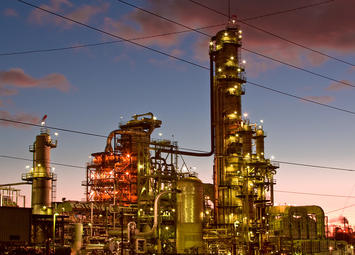
Even though Californians are the most environmentally regulated population on the planet, the Bay Area Air Quality Management District (BAAQMD is proposing a new Rule 6-5 to further reduce particulate emissions from some of the cleanest refineries in the world.
The Agency’s planned emissions controls would ultimately serve only to reduce supplies and raise energy costs even higher for everyone in the region: residents, businesses, and government entities. The BAAQMD actions would hit the poor and those on fixed incomes the hardest, creating a disparate impact in terms of equity, racially biasing more energy costs upon those that can least afford it, while the climate and weather would remain the same.
The Bay Area is home to 44 percent of California’s refining capacity. BAAQMD Rule 6-5, if approved, is expected to force the shutdown, or financially cripple the PBF Martinez and Chevron Richmond refineries in Northern California, as well as the closure of the many businesses in the surrounding counties of Alameda, Contra Costa, Marin, Napa, San Francisco, San Mateo, Santa Clara, Solano, and Sonoma that support those major refineries.
California refineries are the world’s cleanest and most monitored because they operate in the most environmentally-regulated location on earth – the State of California. Hopefully the BAAQMD is cognizant that oil and gas are not just an American industry with its 131 operating refineries in the U.S. as of January 2020 per the Energy Information Administration (EIA), but an international industry with about 700 refineries worldwide that service the demands of 8 billion people.
To date, other American refineries have ceased making conventional hydrocarbon-based motor fuels by shutting down or converting to making renewable diesel, bringing the total closer to 125 operating refineries in the U.S.
The effect of shuttering the supply from California refineries is that the state’s demand for energy would need to be met by imports from foreign suppliers located halfway around the world with significantly less stringent environmental, workplace safety, and human rights controls than California, resulting in increased global emissions, and increased energy costs for Californians. Whether crude or products are imported, Californians pay an environmental penalty due to lax regulations in other countries.
Over the years, we have all seen the impact on California fuel prices when one of the few remaining refinery manufacturers temporarily shuts down for maintenance, or what the industry refers to as a “turnaround.” Gas prices historically spike during these temporary outages. Today, we are seeing prices rise directly because of the permanent closure of the Marathon Martinez Refinery, which cited regulatory costs as a factor in their decision, with fuel prices now at record highs in the Bay Area versus Los Angeles,
Crippling the PBF Martinez and Chevron Richmond refineries will cut off Northern California’s reliable local supply of fuels to meet the demands of gasoline, diesel, and jet fuel for the military, airports, ports, delivery fleets, and other critical infrastructure.
If BAAQMD Rule 6-5 is implemented and local refineries shut down, the state will have to rely on imports from China, the world’s largest polluter, as well as other unreliable foreign countries for the supply of energy to meet the demands of our mobile lifestyles. This will increase worldwide emissions and further hike transportation costs for all 40 million residents of the State.
Read the rest of this piece at CA Political Review.
Ron Stein is an engineer who, drawing upon 25 years of project management and business development experience, launched PTS Advance in 1995. He is an author, engineer, and energy expert who writes frequently on issues of energy and economics.
Photo credit: Pedro Szekely via Flickr under Public Domain License.












